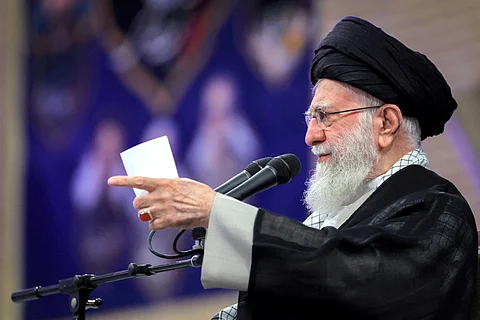
- NEWS
- the EDIT
- COMMENTARY
- BUSINESS
- LIFE
- SHOW
- ACTION
- GLOBAL GOALS
- SNAPS
- DYARYO TIRADA
- MORE

BERLIN, Germany (AFP) — Iran confirmed fresh talks with European powers to be held on Friday in Istanbul, the country’s state media reported, the first since the United States attacked Iranian nuclear facilities a month ago.
Iranian diplomats will meet counterparts from Britain, France and Germany, known as the E3, after the trio warned that sanctions could be reimposed on Tehran if it does return to the negotiating table over its nuclear program.
Western nations and Israel have long accused Iran of seeking to develop nuclear weapons, a charge Tehran has consistently denied.
“In response to the request of European countries, Iran has agreed to hold a new round of talks,” said foreign ministry spokesperson Esmail Baghai, as quoted by state TV on Monday.
The subject of the talks will be Iran’s nuclear program, it added.
A German diplomatic source had told Agence France-Presse on Sunday the E3 were in contact with Tehran and said “Iran must never be allowed to acquire a nuclear weapon.”
“That is why Germany, France and the United Kingdom are continuing to work intensively in the E3 format to find a sustainable and verifiable diplomatic solution to the Iranian nuclear program,” the source said.
Israel launched on 13 June a wave of surprise strikes on its regional nemesis, targeting key military and nuclear facilities.
The United States launched its own set of strikes against Iran’s nuclear program on 22 June, hitting the uranium enrichment facility at Fordo, in Qom province south of Tehran, as well as nuclear sites in Isfahan and Natanz.
Kremlin meeting
Iran and the US had held several rounds of nuclear negotiations through Omani mediators before Israel launched its 12-day war against Iran.
However, US President Donald Trump’s decision to join Israel in striking Iranian nuclear facilities effectively ended the talks.
The E3 countries last met with Iranian representatives in Geneva on 21 June — just one day before the US strikes.
Also Sunday, Russian President Vladimir Putin held a surprise meeting in the Kremlin with Ali Larijani, top adviser to Iran’s supreme leader on nuclear issues.
Larijani “conveyed assessments of the escalating situation in the Middle East and around the Iranian nuclear program,” Kremlin spokesperson Dmitry Peskov said of the unannounced meeting.
Putin had expressed Russia’s “well-known positions on how to stabilize the situation in the region and on the political settlement of the Iranian nuclear program,” he added.
Moscow has a cordial relationship with Iran’s clerical leadership and provides crucial backing for Tehran but did not swing forcefully behind its partner even after the US joined Israel’s bombing campaign.
